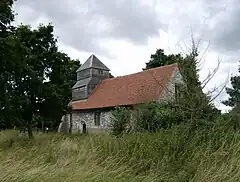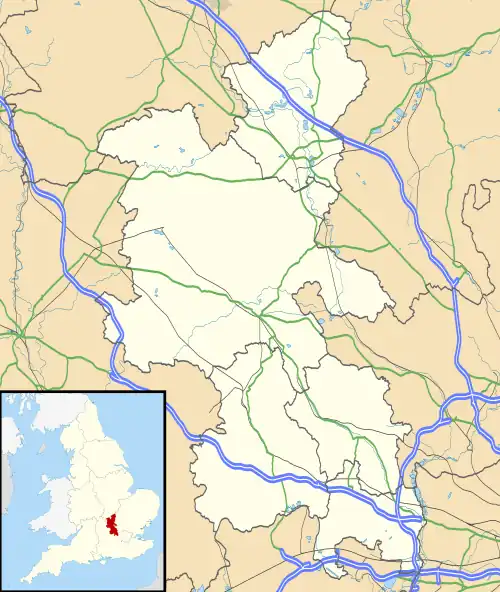| St Mary Magdalene's Church, Boveney | |
|---|---|
 St Mary Magdalene's Church, Boveney, from the southeast | |
 St Mary Magdalene's Church, Boveney Location in Buckinghamshire | |
| 51°29′25″N 0°38′51″W / 51.4903°N 0.6474°W | |
| OS grid reference | SU 940 776 |
| Location | Boveney, Buckinghamshire |
| Country | England |
| Denomination | Anglican |
| Website | Friends of Friendless Churches |
| History | |
| Dedication | Mary Magdalene |
| Architecture | |
| Functional status | Redundant |
| Heritage designation | Grade I |
| Designated | 23 September 1955 |
| Architectural type | Church |
| Groundbreaking | 12th century |
| Completed | 15th century |
| Specifications | |
| Materials | Flint and chalk rubble, with ashlar dressings |
St Mary Magdalene's Church is a redundant Anglican church standing close to the river on the north bank of the Thames, near the village of Boveney, Buckinghamshire, England. It is about 3 kilometres (2 mi) to the west of Eton College. The church, dedicated to Jesus' companion Mary Magdalene, is recorded in the National Heritage List for England as a designated Grade I listed building,[1] and is under the care of the Friends of Friendless Churches.[2] A 360° Google Street View Tour of the church is available.
Early history
A church has been on the site since before the Norman conquest,[3] but the fabric of the present church dates from the 12th century.[1] Windows and the tower were added in the 15th century.[1] The church was built to serve the bargemen working on the River Thames;[2] there was a quay alongside the church but there are now no remains of this.[2] It was a chapel of ease to St Peter's Church, Burnham. An attempt to make it into a separate parish in 1737 failed because sufficient endowment could not be raised.[3] Probably in the middle of the 19th century, a dado of bricks was added to the exterior in an attempt to keep out damp, and in 1897 the window tracery was replaced.[4]
Architecture
St Mary's in constructed in flint and chalk rubble, with ashlar dressings.[1] Small fragments of flint have been inserted in the mortar; this process is partly functional and partly decorative, and is known as galletting.[2] The tower is weatherboarded;[1] it stands on a timber framework, which itself stands on the ground.[3] The door is in the south wall. High in the west wall is a small narrow lancet window that probably dates from the 12th century.[3] Inside the church, some of the original 15th-century pews are still present.[3] Other fittings date from the 18th and 19th centuries.[2] Contained in a glass-fronted box on the north wall of the church are fragments of painted and gilded alabaster sculptures, possibly dating from the 15th century; these depict biblical themes.[3] There is a ring of three bells. The largest of these dates from about 1536 and was cast at the foundry in Reading; the other two bells were cast in 1631 and 1636 by Ellis I. Knight.[5]
Recent history and present day
The church was declared redundant in 1975, and it was planned to demolish it or convert it into residential accommodation.[3] However following a local campaign, it passed into the care of the charity the Friends of Friendless Churches in 1983.[2][3] The charity holds a 999-year lease with effect from 10 June 1983.[6] The church is still consecrated, and has been used for occasional services since 1983.[3] However the church then had to be closed because it was found that the tower had become unstable, and repair was essential.[7] When 19th-century plaster was removed from the footings of the tower, it was found that they were almost completely rotten.[8] The cost of the repair totalled £200,000. Of this, 70% was received as a grant from English Heritage, and the remainder was raised from a number of sources. These included Sir John Smith and the Francis Coales Charitable Foundation, and Eton College who donated the proceeds of their annual "Concert for the Choir".[7] The repair of the tower has been completed, and in 2010–11 another round of repairs is underway, including work on the windows.[7] The repair work carried out on the tower won the Royal Institute of British Architects South Conservation Award for Architects in 2005.[8]
References
- 1 2 3 4 5 Historic England, "Chapel Of St Mary Magdalene, Boveney (1309414)", National Heritage List for England, retrieved 9 April 2015
- 1 2 3 4 5 6 Boveney St Mary Magdalene, Friends of Friendless Churches, archived from the original on 1 July 2011, retrieved 17 July 2010
- 1 2 3 4 5 6 7 8 9 St Mary Magdalene, Boveney, Parish of Eton with Eton Wick and Boveney, archived from the original on 30 January 2010, retrieved 17 July 2010
- ↑ Saunders, Matthew (2010), Saving Churches, London: Frances Lincoln, pp. 25–27, ISBN 978-0-7112-3154-2
- ↑ Boveney, S Mary Magd, Dove's Guide for Church Bell Ringers, retrieved 17 July 2010
- ↑ Churches and chapels owned by the Friends of Friendless Churches: Details for Visitors, London: Friends of Friendless Churches, June 2010
- 1 2 3 The Repair Campaign at Boveney, Friends of Friendless Churches, archived from the original on 1 July 2011, retrieved 17 July 2010
- 1 2 Larner, Catherine (15 June 2007), "Brought back from neglect and decay", Church Times, no. 7527, retrieved 17 July 2010